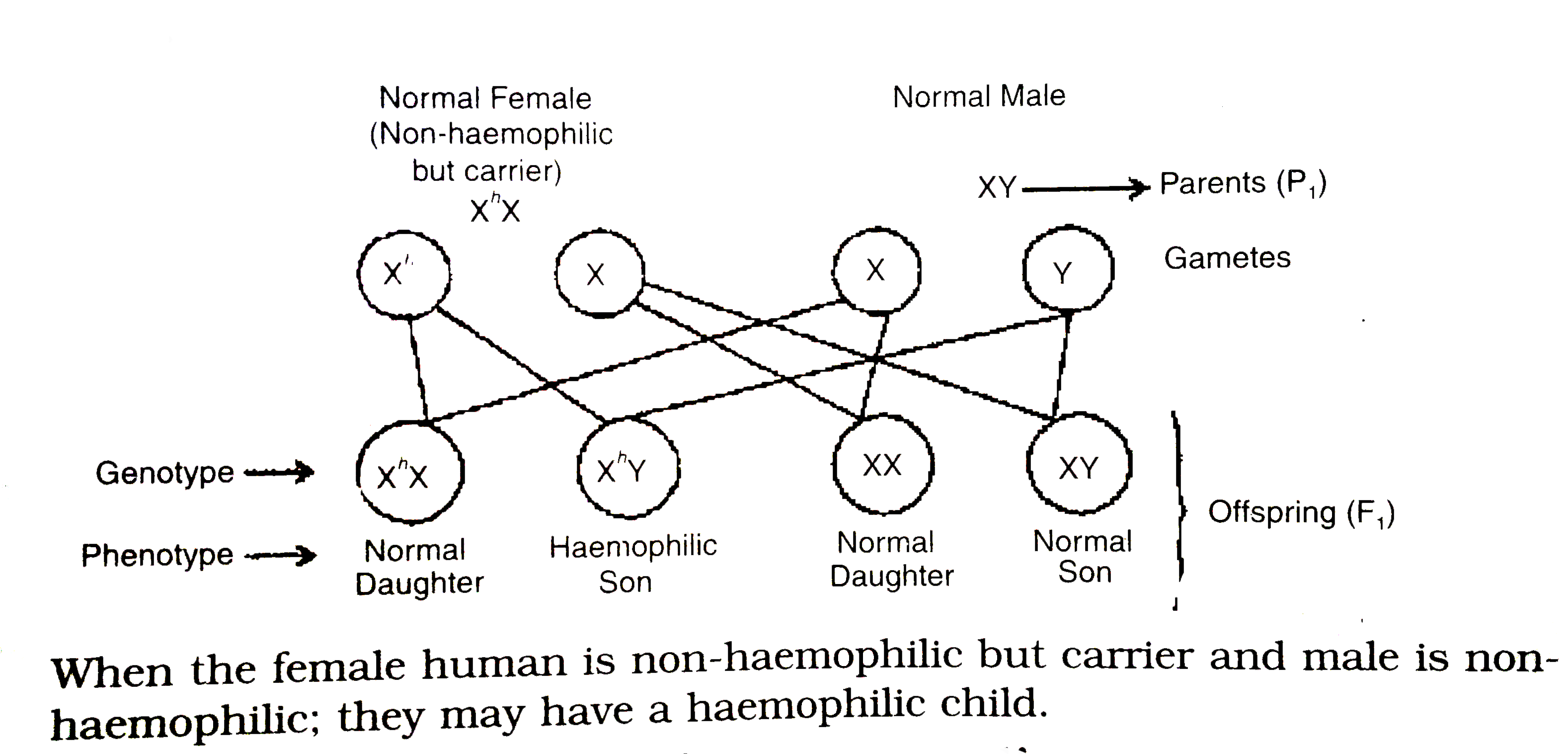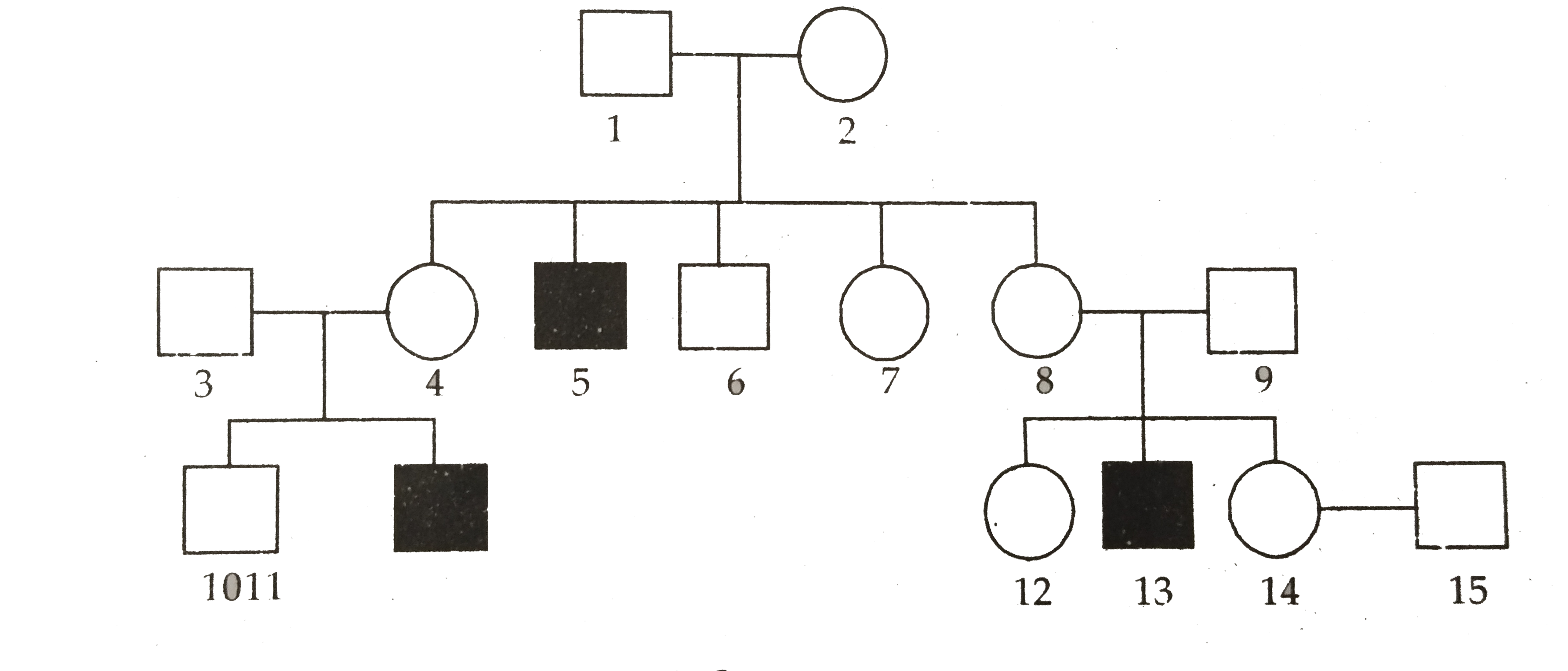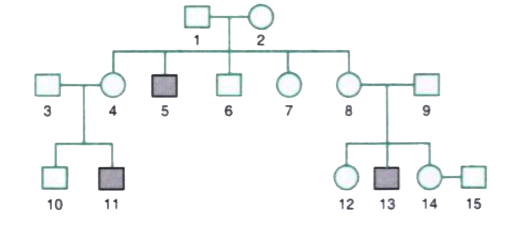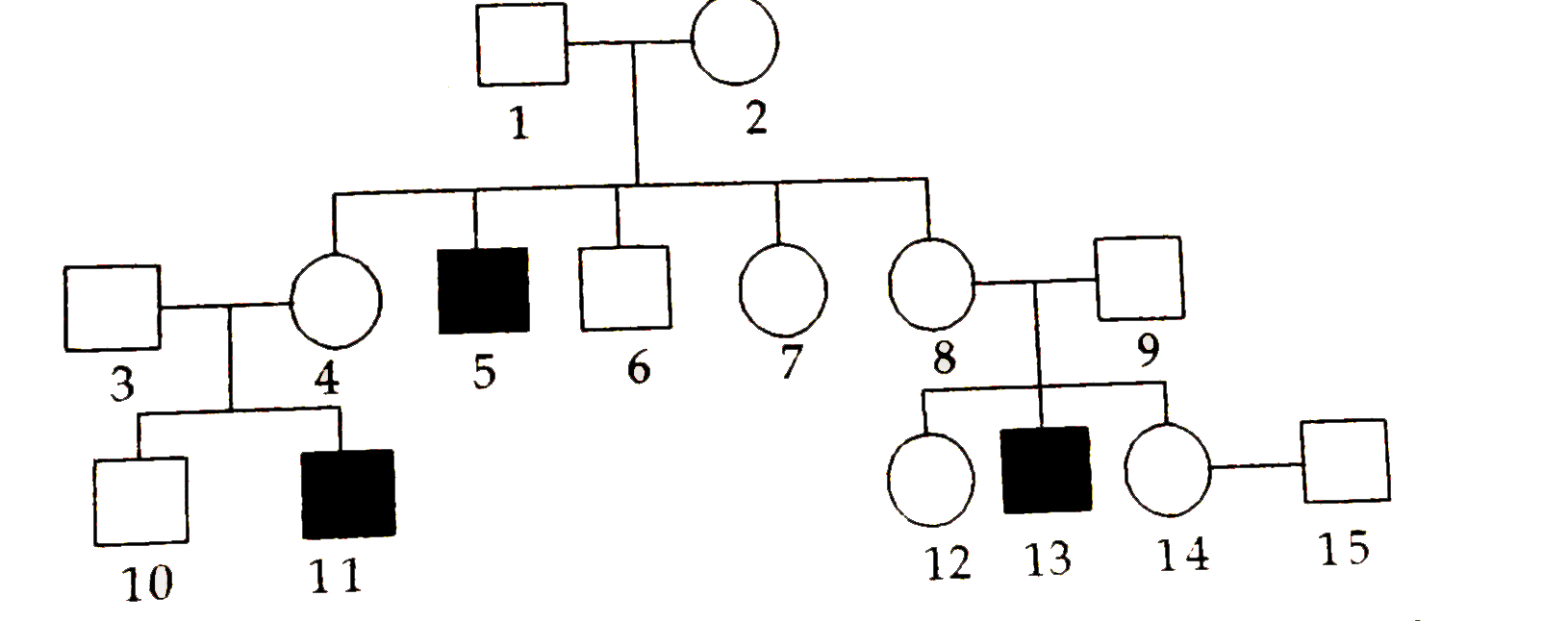A non-haemophilic couple was informed by their doctor that there is possibility of a haemophilic child be born to them. Explain the basis on which the doctor conveyed this information. Give the genotypes and the phenotypes of all the possible children who could be born to them.

When the female human is non-haemophilic but carrier and male is non haemophilic: they may have a haemophilic child.
Topper's Solved these Questions
- GENETICS AND EVOLUTION BOOK - TRUEMEN BIOLOGY ENGLISHCHAPTER - GENETICS AND EVOLUTION EXERCISE - SECTION-D
25 Videos
- GENETICS AND EVOLUTION BOOK - TRUEMEN BIOLOGY ENGLISHCHAPTER - GENETICS AND EVOLUTION EXERCISE - SECTION-B
38 Videos
- GeneticsBOOK - TRUEMEN BIOLOGY ENGLISHCHAPTER - GeneticsEXERCISE - ASSERTION AND REASON
122 Videos
- HUMAN HEALTH AND DISEASEBOOK - TRUEMEN BIOLOGY ENGLISHCHAPTER - HUMAN HEALTH AND DISEASEEXERCISE - MULTIPLE CHOICE QUESTIONS
209 Videos
Similar Questions
A non-haemophilic couple was informed by their doctor that there is possibility oh haemophilic child be born to them. Explain the basis on which the doctor conveyed this information. Give the genotype.
View SolutionA non-haemophilic couple was infomed by their doctor that there is possibility of a haemophilic child being born to them .Draw a checker board and find out the percentage of possibility of such a child among the progeny.
View Solution
Knowledge Check
Passage 1
To avoid . . . the evils of inconstancy and versatility, ten thousand times worse than those of obstinacy and the blindest prejudice, we have consecrated the state, that no man should approach to look into its defects or corruptions but with due caution, that he should never dream of beginning its reformation by its subversion, that he should approach to the faults of the state as to the wounds of a father, with pious awe and trembling solicitude. By this wise prejudice we are taught to look with horror on those children of their country who are prompt rashly to hack that aged parent in pieces, and put him into the kettle of magicians, in hopes that by their poisonous weeds, and wild incantations, they may regenerate the paternal constitution, and renovate their father’s life. Society is indeed a contract. Subordinat contracts for objects of mere occasional interest may be dissolved at pleasure—but the state ought not to beconsidered as nothing better than a partnership agreement in a trade of pepper and coffee, calico or tobacco, or some other such low concern, to be taken up for a little temporary interest, and to be dissolved by the fancy of the parties. It is to be looked on with other reverence, because it is not a partnership in things subservient only to the gross animal existence of a temporary and perishable nature. It is a partnership in all science, a partnership in all art, a partnership in every virtue, and in all perfection. As the ends of such a partnership cannot be obtained in many generations, it becomes a partnership not only between those who are living, but between those who are living, those who are dead, and those who are to be born. . . . The municipal corporations of that universal kingdom are not morally at liberty at their pleasure, and on their speculations of a contingent improvement, wholly to separate and tear asunder the bands of their subordinate community, and to dissolve it into an unsocial, uncivil, unconnected chaos of elementary principles.
Passage 2
Every age and generation must be as free to act for itself, in all cases, as the ages and generations which preceded it. The vanity and presumption of governing beyond the grave, is the most ridiculous and insolent of all tyrannies. Man has no property in man, neither has any generation a property in the generations which are to follow. The Parliament or the people of 1688, or of any other period, had no more right to dispose of the people of the present day, or to bind or to control them in any shape whatever, than the parliament or the people of the present day have to dispose of, bind, or control those who are to live a hundred or a thousand years hence. Every generation is, and must be, competent to all the purposes which its occasions require. It is the living, and not the dead, that are to be accommodated. When man ceases to be, his power and his wants cease with him, and having no longer any participation in the concerns of this world, he has no longer any authority in directing who shall be its governors, or how its government shall be organized, or how administered. . . .
Those who have quitted the world, and those who are not yet arrived at it, are as remote from each other, as the utmost stretch of mortal imagination can conceive. What possible obligation, then, can exist between them, what rule or principle can be laid down, that two nonentities, the one out of existence, and the other not in, and who never can meet in this world, that the one should control the other to the end of time? . . .
The circumstances of the world are continually changing, and the opinions of men change also, and as government is for the living, and not for the dead, it is the living only that has any right in it. That which may be thought right and found convenient in one age, may be thought wrong and found inconvenient in another. In such cases, who is to decide, the living, or the dead?
In Passage 1, Burke indicates that a contract between a person and society differs from other contracts mainly in itsAbrevity and prominence.Bcomplexity and rigidity.Cprecision and usefulness.Dseriousness and permanence.Passage 1
To avoid . . . the evils of inconstancy and versatility, ten thousand times worse than those of obstinacy and the blindest prejudice, we have consecrated the state, that no man should approach to look into its defects or corruptions but with due caution, that he should never dream of beginning its reformation by its subversion, that he should approach to the faults of the state as to the wounds of a father, with pious awe and trembling solicitude. By this wise prejudice we are taught to look with horror on those children of their country who are prompt rashly to hack that aged parent in pieces, and put him into the kettle of magicians, in hopes that by their poisonous weeds, and wild incantations, they may regenerate the paternal constitution, and renovate their father’s life. Society is indeed a contract. Subordinat contracts for objects of mere occasional interest may be dissolved at pleasure—but the state ought not to beconsidered as nothing better than a partnership agreement in a trade of pepper and coffee, calico or tobacco, or some other such low concern, to be taken up for a little temporary interest, and to be dissolved by the fancy of the parties. It is to be looked on with other reverence, because it is not a partnership in things subservient only to the gross animal existence of a temporary and perishable nature. It is a partnership in all science, a partnership in all art, a partnership in every virtue, and in all perfection. As the ends of such a partnership cannot be obtained in many generations, it becomes a partnership not only between those who are living, but between those who are living, those who are dead, and those who are to be born. . . . The municipal corporations of that universal kingdom are not morally at liberty at their pleasure, and on their speculations of a contingent improvement, wholly to separate and tear asunder the bands of their subordinate community, and to dissolve it into an unsocial, uncivil, unconnected chaos of elementary principles.
Passage 2
Every age and generation must be as free to act for itself, in all cases, as the ages and generations which preceded it. The vanity and presumption of governing beyond the grave, is the most ridiculous and insolent of all tyrannies. Man has no property in man, neither has any generation a property in the generations which are to follow. The Parliament or the people of 1688, or of any other period, had no more right to dispose of the people of the present day, or to bind or to control them in any shape whatever, than the parliament or the people of the present day have to dispose of, bind, or control those who are to live a hundred or a thousand years hence. Every generation is, and must be, competent to all the purposes which its occasions require. It is the living, and not the dead, that are to be accommodated. When man ceases to be, his power and his wants cease with him, and having no longer any participation in the concerns of this world, he has no longer any authority in directing who shall be its governors, or how its government shall be organized, or how administered. . . .
Those who have quitted the world, and those who are not yet arrived at it, are as remote from each other, as the utmost stretch of mortal imagination can conceive. What possible obligation, then, can exist between them, what rule or principle can be laid down, that two nonentities, the one out of existence, and the other not in, and who never can meet in this world, that the one should control the other to the end of time? . . .
The circumstances of the world are continually changing, and the opinions of men change also, and as government is for the living, and not for the dead, it is the living only that has any right in it. That which may be thought right and found convenient in one age, may be thought wrong and found inconvenient in another. In such cases, who is to decide, the living, or the dead?
Which choice provides the best evidence for the answer to the previous question?ALines 1-4 (“To avoid . . . state”)BLines 7-9 (“he should . . . solicitude”)CLines 27-29 (“It is . . . perfection”)DLines 34-38 (“The municipal . . . community”)Passage 1
To avoid . . . the evils of inconstancy and versatility, ten thousand times worse than those of obstinacy and the blindest prejudice, we have consecrated the state, that no man should approach to look into its defects or corruptions but with due caution, that he should never dream of beginning its reformation by its subversion, that he should approach to the faults of the state as to the wounds of a father, with pious awe and trembling solicitude. By this wise prejudice we are taught to look with horror on those children of their country who are prompt rashly to hack that aged parent in pieces, and put him into the kettle of magicians, in hopes that by their poisonous weeds, and wild incantations, they may regenerate the paternal constitution, and renovate their father’s life. Society is indeed a contract. Subordinat contracts for objects of mere occasional interest may be dissolved at pleasure—but the state ought not to beconsidered as nothing better than a partnership agreement in a trade of pepper and coffee, calico or tobacco, or some other such low concern, to be taken up for a little temporary interest, and to be dissolved by the fancy of the parties. It is to be looked on with other reverence, because it is not a partnership in things subservient only to the gross animal existence of a temporary and perishable nature. It is a partnership in all science, a partnership in all art, a partnership in every virtue, and in all perfection. As the ends of such a partnership cannot be obtained in many generations, it becomes a partnership not only between those who are living, but between those who are living, those who are dead, and those who are to be born. . . . The municipal corporations of that universal kingdom are not morally at liberty at their pleasure, and on their speculations of a contingent improvement, wholly to separate and tear asunder the bands of their subordinate community, and to dissolve it into an unsocial, uncivil, unconnected chaos of elementary principles.
Passage 2
Every age and generation must be as free to act for itself, in all cases, as the ages and generations which preceded it. The vanity and presumption of governing beyond the grave, is the most ridiculous and insolent of all tyrannies. Man has no property in man, neither has any generation a property in the generations which are to follow. The Parliament or the people of 1688, or of any other period, had no more right to dispose of the people of the present day, or to bind or to control them in any shape whatever, than the parliament or the people of the present day have to dispose of, bind, or control those who are to live a hundred or a thousand years hence. Every generation is, and must be, competent to all the purposes which its occasions require. It is the living, and not the dead, that are to be accommodated. When man ceases to be, his power and his wants cease with him, and having no longer any participation in the concerns of this world, he has no longer any authority in directing who shall be its governors, or how its government shall be organized, or how administered. . . .
Those who have quitted the world, and those who are not yet arrived at it, are as remote from each other, as the utmost stretch of mortal imagination can conceive. What possible obligation, then, can exist between them, what rule or principle can be laid down, that two nonentities, the one out of existence, and the other not in, and who never can meet in this world, that the one should control the other to the end of time? . . .
The circumstances of the world are continually changing, and the opinions of men change also, and as government is for the living, and not for the dead, it is the living only that has any right in it. That which may be thought right and found convenient in one age, may be thought wrong and found inconvenient in another. In such cases, who is to decide, the living, or the dead?
As used in line 4, “state” most nearly refers to aAstyle of living.Bposition in life.Ctemporary condition.Dpolitical entity.
A normal couple has their first child, who is haemophilic. Work out a cross to show how it is possible. State the possibility of the normal and the haemophilic children, along with their sexes, that can be born to them.
View SolutionA normal man marries a woman who is a carrier for colour blindness. What will be the phenotypes of the children born to them? Depict the phenotypes through a possible cross.
View SolutionHaemophilia is a sex linked recessive disorder of humans. The pedigree chart given below shows the inheritance of haemophilia in one family. Study the pattern of inheritance and answer the questions given

Give all the possible genotypes of the members 4,5 and 6 in the pedigree chart.
(b) A blood test shows that the individual 14 is a carrier of haemophilia. The member numbered 15 has recently married the member numbered 14. What is the probability that their first child will be a haemophilic male? Show with the help of Punnett square.
View SolutionHaemophilia is a sex-linked recessive disorder of humans. The given pedigree chart shows the inheritance of haemophilia in one family. Study the pattern of inheritance and answer the questions given.
(a) Give all the possible genotypes of the members 4, 5 and 6 in the pedigree chart. (b) A blood test shows that the individual 14 is a carrier of haemophilia. The member number 15 has recently married the member numbered 14. What is the probability that their first child will be a haemophilic male?

View SolutionHaemophilia is a sex linked recessive disorder of humans. The pedigree chart given below shows the inheritance of Haemophilia in one family. Study the pattern of inheritance and answer the questions given.

(a) Give all the possible genotypes of the members 4, 5 and 6 in the pedigree chart.
(b) A blood test shows that the individual 14 is a carrier of gaemophilia. The member numbered 15 has recently married the member numbered 14. What is the probability that their first child will be a haemophilic male ? Show with the help of Punnett square.
View Solution
